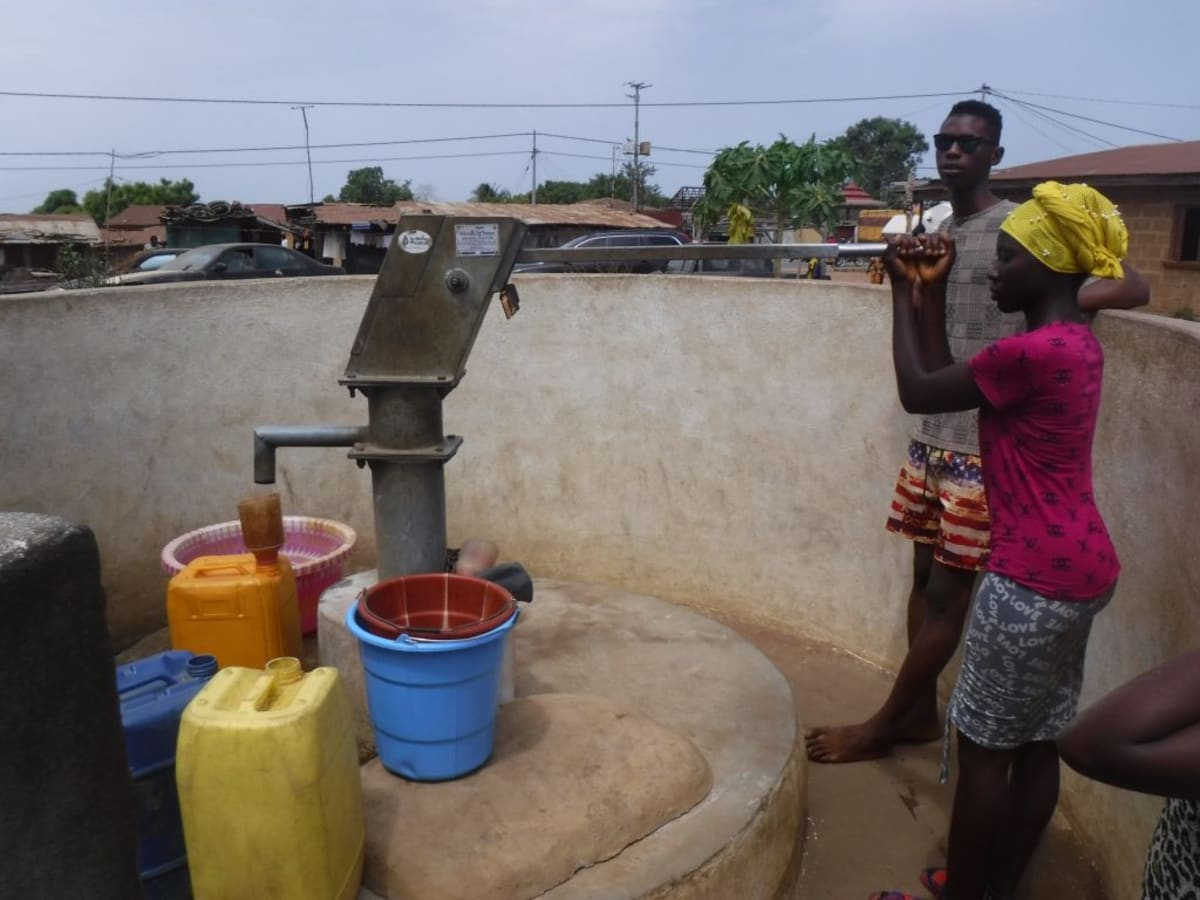The main water point for this community of 350 people in Rotifunk, Sierra Leone, is a hand-dug well at the Paramount Chief's compound entrance. Over the years, the well has served the entire community well; the Paramount Chief does not allow the well to be down for more than a few days without the issue being resolved. This was despite the added pressure and increasing number of people each year who came to collect water from the well, coming from communities that did not have as clean or reliable a water source as the well.
More recently, however, the added number of water users has started to weigh more heavily on the well's more local users. There is never a time when the well is not crowded. Some people will leave their empty containers at the well to save their place in line, and then head back home to continue other chores until it is their turn to fetch water. The wait can be hours long.
Compounding the time lost to the long lines at the well, over time, the water table has dropped as a result of climate change in the region. This leads to a slower recharge rate and results in a lower flow rate - meaning it takes longer for people to fill up their containers. People now wait even longer to get water, and the situation is deteriorating.
"I have lived in this community all my life, and the water situation is getting worse every year," said Hassan Kamara, a teacher at the community's primary school.
"I am a member of the well's water user committee and live a stone's throw away from the well. My family has to get up very early in the morning and also make use of the well very late in the afternoon to fetch water. We try our best as a community to keep the water well functioning with no interruption of service."
The long lines and wait time at the borehole mean that some women and children can lose almost their entire day to the wait for water, but they have little choice. There is another well, but it is located across the busy and dangerous highway that cross-cuts the community. Parents refuse to allow their children to cross the street for fear of them getting hit by a speeding vehicle. The parents prefer standing in long lines than sending their children across the heavily trafficked main motor road.
"The challenges are plenty, but one thing we have agreed upon as a community is the lives of our family members are important, so sending them across the street is a risk they are not willing to take," Hassan added.
At the well, all the time spent waiting for means patience can, understandably, run low. Community members say that arguments and fights are prevalent at the water source and, most times, extend from and include parents.
We also spoke with teenager Aminata while visiting the well. She said that she fetches water every day immediately after getting home from school since most other students take a break to eat. She, too, lives a short distance from the well and reports that people wait in line for hours during the dry season.
"Accidents have occurred with people trying to cross the street. These have discouraged parents from sending their children to fetch water. I pray that we will get another well on this side of the main road to lessen the burden on the only available well," she said.
The most common livelihood in the community is petty trading. People also work as mechanics, teachers, welders, and carpenters. In the early morning hours across the community, women, men, and children scramble to prepare their various foods to sell for the day. The local court is open daily, and a lot of traders make their living by selling food and other items to court attendees. The court brings income for the Paramount Chief and his assistants while also putting food on the table for hundreds of families through their business there.
What We Can Do:
Well Rehabilitation
The well marked for this overhaul is dry for a few months every year and needs major work to supply adequate, clean water to the community year-round. The pump will be removed, and a hand auger will be lowered inside and powered by a drill team. This hand auger will allow the team to drill several meters deeper to hit a sufficient water column to ensure the well supplies water throughout all seasons.
As the team drills, the casing will be installed, transforming the bottom of this hand-dug well into a borehole. PVC piping will connect this lower system directly to the pump, a construction that we know will also improve the quality of water.
Once this plan is implemented, everyone within the community will have access to safe drinking water in quality and quantity, even through the dry months.
Hygiene and Sanitation Training
There will be hygiene and sanitation training sessions offered for three days in a row.
After our visit, the hygiene and sanitation trainer decided it would be best to teach community members how to build a tippy tap (a hand-washing station built with a jerrycan, string, and sticks). They will use these tippy taps for handwashing demonstrations and will also teach about other tools like dish racks and the importance of properly penning in animals.
This training will also strengthen the water user committee that manages and maintains this well. They enforce proper behavior and report to us whenever they need our help solving a serious problem, like a pump breakdown.





































